| "C'mon Aussie C'mon" | |
|---|---|
 | |
| Single by Mojo singers. | |
| Released | 1978 |
| Recorded | 1978 |
| Genre | Advertising jingle |
| Length | 2:20 |
| Label | WEA |
| Songwriter(s) | Allan Johnston, Alan Morris, G Koos, S Baird |
"C'mon Aussie C'mon" is an iconic [1] Australian cricket anthem.
| "C'mon Aussie C'mon" | |
|---|---|
 | |
| Single by Mojo singers. | |
| Released | 1978 |
| Recorded | 1978 |
| Genre | Advertising jingle |
| Length | 2:20 |
| Label | WEA |
| Songwriter(s) | Allan Johnston, Alan Morris, G Koos, S Baird |
"C'mon Aussie C'mon" is an iconic [1] Australian cricket anthem.
The work was written as a 60-second jingle by Allan Johnston, Alan Morris and other creative staff at the Sydney advertising agency Mojo in 1978 to promote the second season of Kerry Packer's cricket competition World Series Cricket for the Nine television network. [2] The song eulogised players such as Dennis Lillee, the Chappell brothers Ian and Greg and Rod Marsh, used the limerick metre in its verse structure and ended with the refrain, "C'mon Aussie, c'mon, c'mon" sung again and again.
The popularity of the chorus and the success that the new cricket competition enjoyed in the 1978/79 summer season inspired the Mojo agency to recut the track and release it as a single in 1978. The jingle's double limerick was split into two, additional refrains were added and a 2' 15" version was produced for radio release and sale. Performed by the Mojo Singers (including Allan Johnston and other agency and recording studio personnel), it topped the charts in Australia for two weeks in February 1979. [3]
The jingle continued to be used to promote World Series Cricket in subsequent seasons even after the rebel competition was reunited with the sanctioned Australian Cricket Board fixtures. The song was played at the WSC games and the chorus was sung by crowds at those games and also the official Test matches. In those subsequent advertising campaigns the lyrics would change to announce who the Australian cricket team's opponents for that summer and to highlight the latest stars of the team.[ citation needed ]
| Chart (1979) | Peak position |
|---|---|
| Australia (Kent Music Report) [4] | 1 |
| Chart (1979) | Peak position |
|---|---|
| Australia (Kent Music Report) [5] [6] | 22 |
| "C'mon Aussie C'mon" | ||||
|---|---|---|---|---|
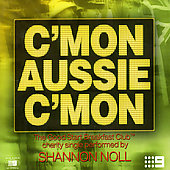 | ||||
| Single by Shannon Noll | ||||
| Released | 20 December 2004 | |||
| Recorded | 2004 | |||
| Genre | Pop | |||
| Length | 3:28 | |||
| Label | Sony BMG | |||
| Songwriter(s) | Allan Johnston, Alan Morris, G Koos, S Baird | |||
| Producer(s) | Mark Rivett | |||
| Shannon Noll singles chronology | ||||
| ||||
In 2004, Australian singer Shannon Noll recorded a cover with updated lyrics. The track was released on 20 December 2004 to aid the children's charity Good Start, a joint charity set up by the Australian Red Cross and Sanitarium foods to raise money to ensure all Australian children start the day with a healthy breakfast.
In December 2019, the jingle was reprised by Commonwealth Bank ahead of the ICC Women's T20 World Cup 2020. New lyrics about members of the Australia women's cricket team, including Beth Mooney, Meg Lanning and Ellyse Perry, were written by Hamish Stewart from advertising agency GHO Sydney and recorded by Allan Johnston, one of the original creators. [7] Any profits from streaming or downloads went to the McGrath Foundation, the breast cancer charity founded by former Australian cricketer Glenn McGrath. The song also featured in commercials for Commonwealth Bank supporting the women's team. [8]
| Chart (1979) | Peak position |
|---|---|
| Australian Kent Music Report | 1 |
| Chart (2004) | Peak position |
| Australian ARIA Singles Chart | 2 |
| Australian ARIA Australian Artists Singles Chart | 2 |
| Australian ARIA Singles End of Year Chart (2005) | 43 |
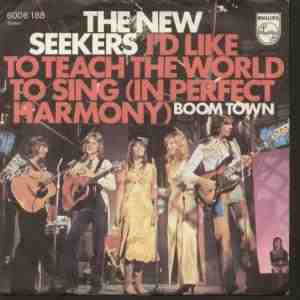
"I'd Like to Teach the World to Sing (In Perfect Harmony)" is a pop song (originally known as "True Love and Apple Pie") by British hit songwriters Roger Cook and Roger Greenaway, and sung by Susan Shirley.

"Khe Sanh" is the debut single by Australian rock band Cold Chisel, released in May 1978 as a 45 rpm single, and named after the district capital of Hướng Hóa District, Quảng Trị Province, Vietnam. Written by pianist Don Walker, "Khe Sanh" concerns an Australian Vietnam veteran dealing with his return to civilian life. According to Toby Creswell's liner notes for the band's 1991 compilation album Chisel, the song is also a story of restless youth. A further context of the song is that "soldiers met a hostile reception on their return home".
Mojo may refer to:
Michael Brady is an English-born Australian musician, most commonly associated with the Australian rules football anthems "Up There Cazaly", referring to 1910s St Kilda and 1920s South Melbourne player Roy Cazaly, and "One Day in September", which were released by The Two-Man Band. Both songs have become synonymous with Australian rules football and are traditionally sung on AFL Grand Final day in September.

"Flame Trees" is a song by Australian pub rock band Cold Chisel from their 1984 album Twentieth Century. One of their best known songs, it was written by drummer Steve Prestwich and keyboardist Don Walker. On its release it reached No. 26 on the Kent Music Report Singles Chart. It resurfaced in August 2011 due to download sales, peaking at No. 54 on the ARIA chart.
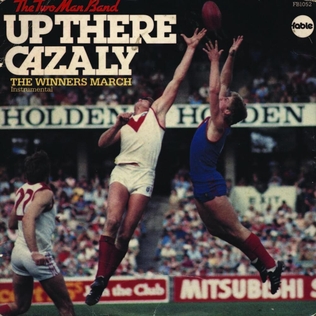
"Up There Cazaly" is 1979 song by Mike Brady, written to promote Channel Seven's coverage of the Victorian Football League (VFL). It was first performed by the Two-Man Band, a duo of Brady and Peter Sullivan, and has since become an unofficial anthem of Australian rules football.
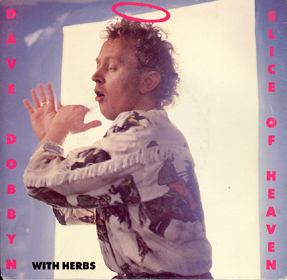
"Slice of Heaven" is a single by New Zealand singer-songwriter Dave Dobbyn with the band Herbs, released in 1986 on the soundtrack of the animated motion picture, Footrot Flats: The Dog's Tail Tale. The single reached No. 1 on the New Zealand Singles Chart for eight weeks and on the Australian Singles Chart for four weeks. It appears on Dobbyn's 1988 album, Loyal.
Hush were an Australian glam rock pop band, which formed in 1971 and disbanded in 1977.
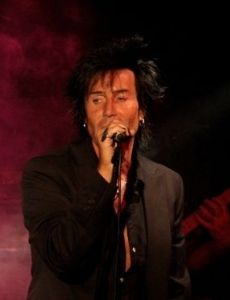
James Randall Freud was an Australian rock musician-songwriter. He was a member of Models during the 1980s and wrote their two most popular singles, "Barbados" and "Out of Mind, Out of Sight".

"What's My Scene?" is a song by Australian rock group Hoodoo Gurus. It was released in March 1987 as the lead single from their third studio album Blow Your Cool!. The song reached number 3 in Australia.

"Working Class Man" is a song performed and made famous by Australian singer Jimmy Barnes. It was written by Journey keyboardist Jonathan Cain. "Working Class Man" is generally considered Barnes' signature song as a solo artist.
"Wild One" or "Real Wild Child" is an Australian rock and roll song written by Johnny Greenan, Johnny O'Keefe, and Dave Owens. While most sources state that O'Keefe was directly involved in composing the song, this has been questioned by others. Sydney disc jockey Tony Withers was credited with helping to get radio airplay for the song but writer credits on subsequent versions often omit Withers, who later worked in the United Kingdom on pirate stations Radio Atlanta and, as Tony Windsor, on Radio London.

"Great Southern Land" is a song by Australian rock band Icehouse. It was released on 9 August 1982 as the lead single from their second studio album Primitive Man. It peaked at No. 5 on the Australian Singles Chart, it was later featured in the 1988 Yahoo Serious film Young Einstein, and remains their most popular songs according to listeners of Triple M in 2007.

"Gimme Hope Jo'anna" is a British anti-apartheid song written and originally released by Guyanese-British singer, songwriter and multi-instrumentalist Eddy Grant in 1988, during the apartheid era in South Africa. The song was banned by the South African government when it was released, but was widely played there nonetheless. It reached number seven on the UK Singles Chart, becoming Grant's first British top 10 hit for five years.
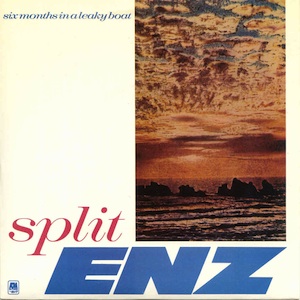
"Six Months in a Leaky Boat" is a song by New Zealand art rock group Split Enz. It was released in May 1982 as the second single from the group's eighth studio album, Time and Tide.
Mojo was an Australian advertising agency formed in Sydney by Alan Morris ("Mo") and Allan Johnston ("Jo") in 1979. Its lineage can today be traced to the Australian offices of Publicis, an Australian subsidiary of the French multinational advertising and communications company holding Publicis Groupe. Those offices traded as Publicis Mojo from the late 1990s until 2016.
Allan "Jo" Johnston is an Australian advertising creative executive and copywriter who was successful as a jingle writer, particularly in the 1970s and 1980s. He was born in Adelaide, Australia. Together with his long-time business partner Alan Morris, he formed the Australian advertising agency Mojo which enjoyed much Australian and some international success in the 1980s and whose name survived until 2016 as Publicis Mojo, the Australian subsidiary of the French multinational advertising and communications company holding Publicis Groupe.
Alan "Mo" Morris was an Australian advertising creative executive, a copywriter who enjoyed particular success in the 1970s and 80s. Together with his long-time business partner Allan Johnston, he formed the Australian advertising agency Mojo which enjoyed much local and some international success in the 1980s and whose name survived till 2016 as Publicis Mojo, the Australian subsidiary of the French multinational advertising and communications company holding Publicis Groupe.
"From St Kilda to Kings Cross" is a song performed and written by Australian musician Paul Kelly. The title refers to inner city suburbs St Kilda in Melbourne and Kings Cross in Sydney. It was released in April 1985 as the only single from Kelly's first solo album Post. The single did not chart on the Australian Kent Music Report Singles Chart. The song has found later acclaim with it appearing on lists for 'Top 20 Sydney Songs' and 'Top 25 Melbourne Songs'. The track has been recorded by other artists including Bob Evans' version on Before Too Long – a Paul Kelly tribute album.
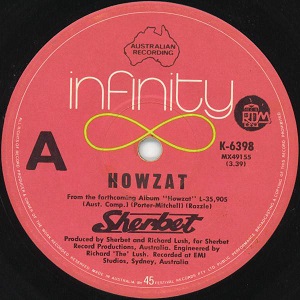
"Howzat" is a song by Australian band Sherbet, released in May 1976. The song reached number 1 in Australia on the Kent Music Report and it also reached number 1 in New Zealand on the Recorded Music NZ. It was released from Sherbet's album of the same name, Howzat. The song was written by band members Garth Porter and Tony Mitchell. The title track was also a number one hit and remains the group's biggest hit, especially outside of Australia, reaching the top 5 of the UK charts and also entering the lower end of the US Billboard Hot 100 chart.